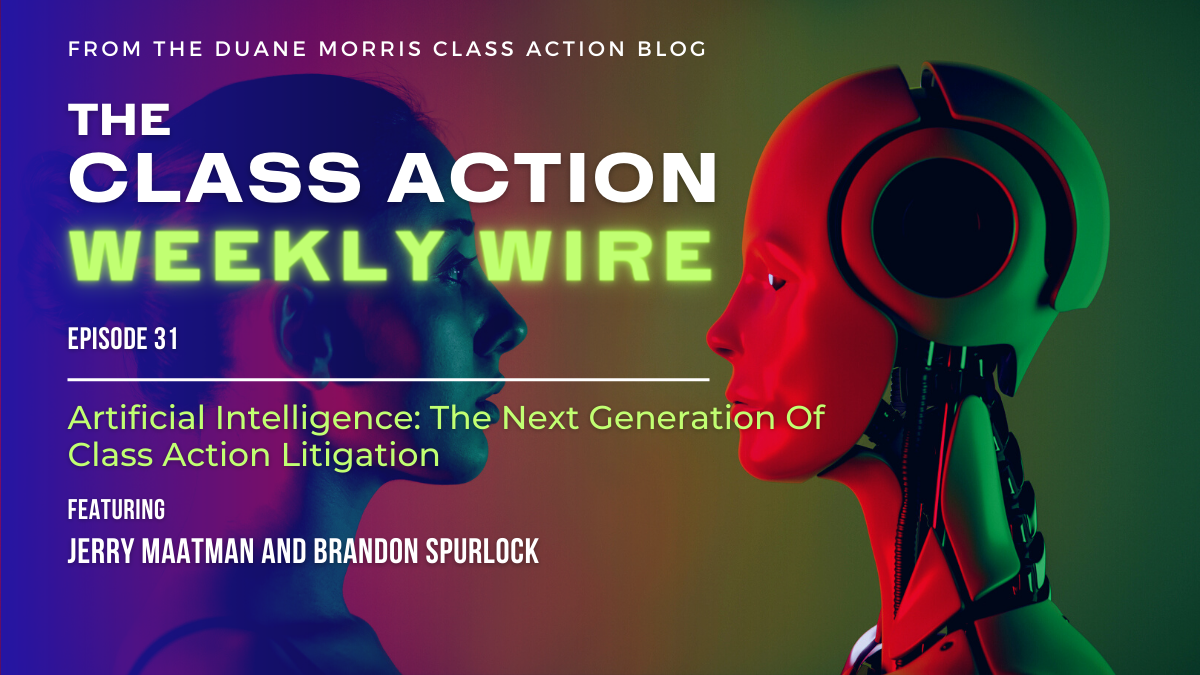 Duane Morris Takeaway: This week’s episode of the Class Action Weekly Wire features Duane Morris partner Jerry Maatman and special counsel Brandon Spurlock with their discussion of the Senate Banking Committee’s hearing this week regarding consumer protection in the financial sector from the risks of artificial intelligence, as well as their analysis of the potential implications in the regulatory environment and class action space as AI continues to be utilized in workplace and commercial operations.
Duane Morris Takeaway: This week’s episode of the Class Action Weekly Wire features Duane Morris partner Jerry Maatman and special counsel Brandon Spurlock with their discussion of the Senate Banking Committee’s hearing this week regarding consumer protection in the financial sector from the risks of artificial intelligence, as well as their analysis of the potential implications in the regulatory environment and class action space as AI continues to be utilized in workplace and commercial operations.
Episode Transcript
Jerry Maatman: Welcome, loyal blog readers and listeners to our Friday weekly podcast series. I’m joined by my colleague Brandon Spurlock today, and we’re going to be focusing on artificial intelligence and the fact that that issue has been foremost in the mind of legislators in Washington, D.C. Brandon, welcome to our weekly podcast.
Brandon Spurlock: Thanks, Jerry. Always happy to be here.
Jerry: Brandon, there was quite a lot of activity at the Senate Banking Committee this week with respect to artificial intelligence. It involved consumers and protection of consumers. To me AI is everywhere and in the news, in terms of how it impacts the workplace, how it impacts consumers – what’s your take away from what occurred in Washington, D.C. this week?
Brandon: Yeah, Jerry, this topic is exploding everywhere, and the changes in every sector are fast and furious is AI advances. The hearing was led by the committee’s chairman, Democratic Senator Sherrod Brown from Ohio. Brown opened the hearing by highlighting positive aspects of technology for society in the financial world. And you think about things like ATM machines providing quick access to money, smartphone apps that can access banking online and bill paying, but also explain that automation has led to many of the financial crises that we’ve seen in the past two decades. Brown stressed that any AI use in the financial sector should be utilized to make the economy better for consumers, and that there should be significant safeguards in place to ensure that it does so.
His Republican counterpart, Senator Mike Rounds of South Dakota, who was filling in for the committee’s ranking member, also stressed the risks of AI, but took a different stance on the issues of regulation. He stated that there should be regulations regarding “transparency and explainability in decision-making, especially where credit is involved” – but that Congress should take a “pro-innovative stance” so the U.S. can attract talent, and that halting the progress of AI in the financial sector could put the U.S. at a competitive disadvantage.
Jerry: It struck me that here is a great example of technology accelerating faster than the law, and the law is trying to catch up, and government regulators are thinking about the void that exists in the system about regulation. I know that the Senate Committee and Senator Brown focused on fraud and antitrust concerns, but the overlay also was in the fear that artificial intelligence incorporates a bias, that use of the artificial intelligence could have an adverse impact on protected minority groups. What’s your takeaway in terms of what we’re going to see in the future in this particular area?
Brandon: Well, that’s spot on Jerry. Brown highlighted several AI tools that companies in the financial sector already use have been shown to have ingrained discriminatory biases towards Black and Latino American borrowers. Specifically, banks use algorithms and machine learning AI models and consumer lending that can determine a borrowers creditworthiness. But it often automates, super charges the biases that end up excluding minorities.
Jerry: I know that the Consumer Financial Protection Bureau is dabbling in this area, also focusing on regulations. But it seems to me that this is an area that the plaintiffs’ class action bar is following. And my sense is that we’re going to see a tipping point soon where there is going to be private plaintiff lawsuits brought over these issues with allegations that either the use of the AI implicated antitrust or fraud concerns or discrimination, either in the employment arena in the workplace, or with the extension of credit or with loans. What’s your takeaway of class action risks in this area?
Brandon: Well, you know there was a committee witness attending the hearing, Daniel Gorfine. He’s the founder and CEO of advisory firm Gattaca Horizons, and he’s a former chief innovation officer with the CFTC. He noted the risk of AI, but stated the “speculative fear or fear of future harm … should not broadly block development of AI in financial services.”
Another witness, University of Michigan computer science and engineering professor Michael Wellman, urged that public and open knowledge on what practices can create risk will help better prepare financial systems for AI and inspire market rules and systems that remain resilient to AI’s inevitable impacts.
So with all this said, Jerry, there will probably be no shortage of class action lawsuits that are filed, and I think as we see how those class actions progress, we’ll also see how they impact the regulatory environment. I think both are going to have an impact on one another.
Jerry: Brandon, you’re a thought leader in this area, and we’ll be closely following artificial intelligence and its implications in litigation and government regulation, and in terms of what it means to companies in the private sector. Sincerely appreciate you lending your expertise today to our podcast and thanks so much for joining us.
Brandon: Thanks for having me, Jerry.
